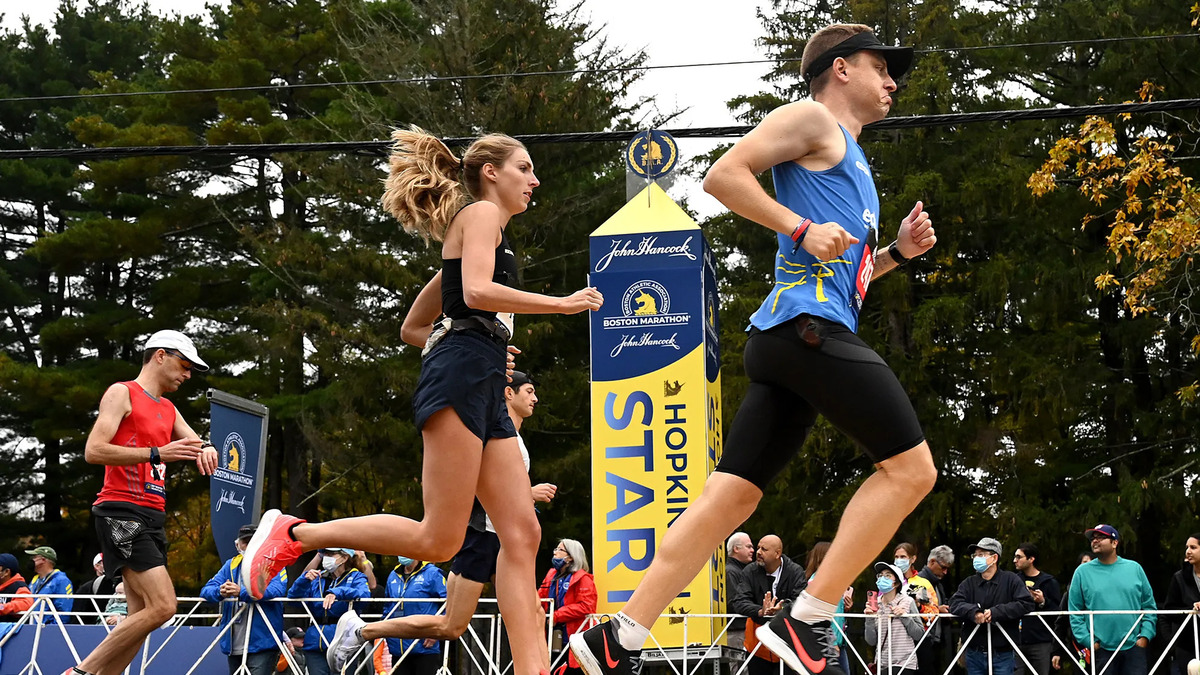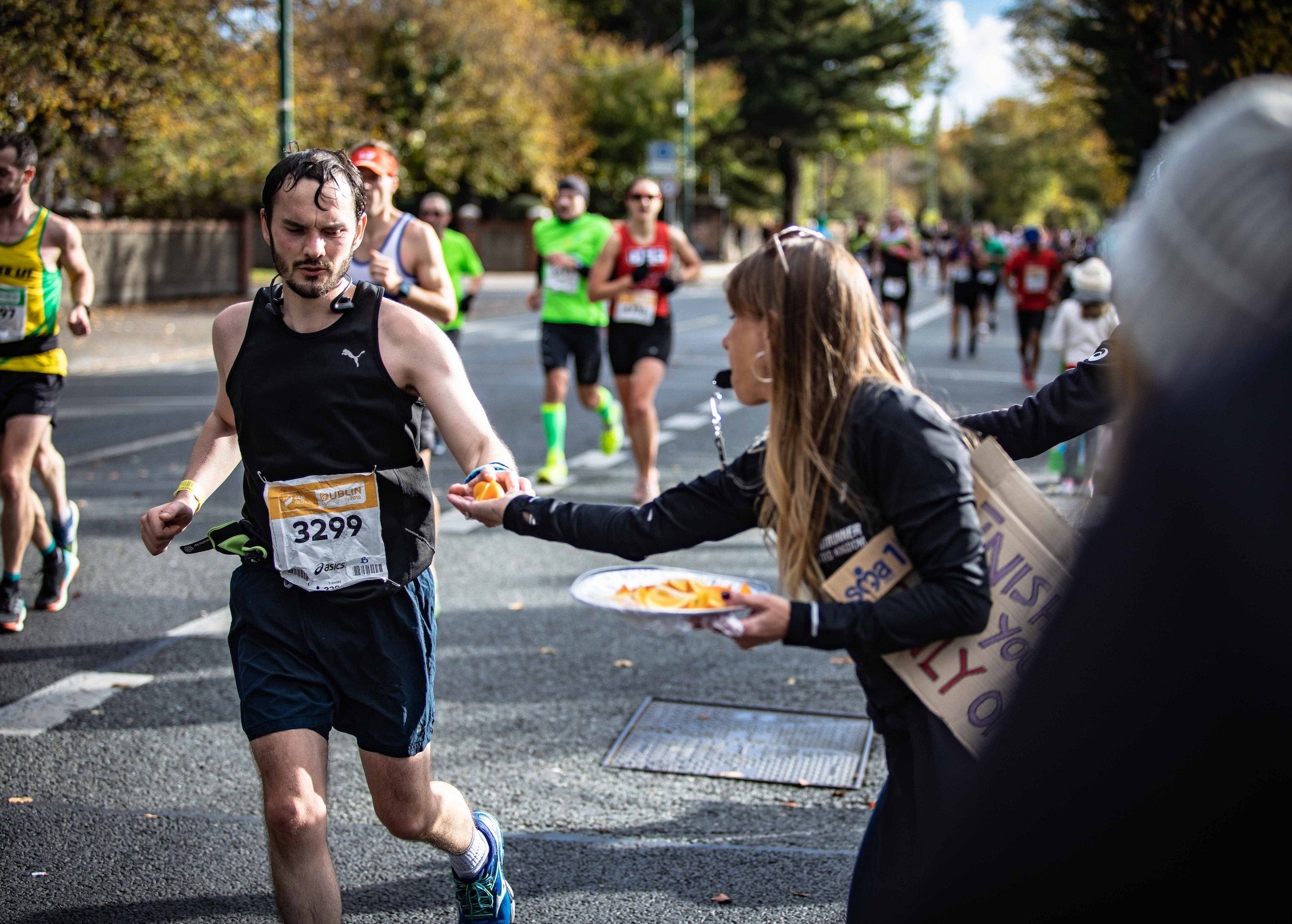

Featured
What Is The Pace For A 6-Hour Marathon
Modified: January 22, 2024
Learn about the pace needed for a 6-hour marathon in this featured article. Find out what it takes to achieve this challenging goal and improve your marathon performance.
Introduction
Completing a marathon is a remarkable accomplishment that requires physical endurance, mental fortitude, and strategic planning. The marathon distance of 42.195 kilometers (26.2 miles) is a challenging endeavor that tests the limits of a runner’s stamina and determination. While some runners strive for a podium finish or a personal best time, others aim to complete the marathon at a more leisurely pace, such as a 6-hour marathon.
A 6-hour marathon pace allows runners to enjoy the experience, soak in the atmosphere, and savor every mile of the race. It caters to those who prioritize the journey over the destination. Whether you’re a beginner taking on your first marathon or an experienced runner aiming for a slower pace, this article will guide you through the factors to consider, training strategies to adopt, and tips to ensure a successful 6-hour marathon.
While elite runners might complete a marathon in less than 2 hours, the majority of recreational runners fall into a wider spectrum of finishing times. The pace for a 6-hour marathon averages around 8 minutes and 35 seconds per kilometer (13 minutes and 48 seconds per mile). However, it is important to note that pace can vary depending on factors such as terrain, weather conditions, and individual fitness level.
Running at a slower pace affords marathoners the opportunity to better enjoy the race, engage with spectators, and appreciate the scenic route. It also allows for less strain on the body, reducing the risk of injury. Training for a 6-hour marathon requires a different approach compared to more competitive goals, and it’s crucial to understand the specific considerations and strategies in order to achieve success.
In the following sections, we will delve into the various factors that can affect your marathon pace, discuss training strategies tailored for a 6-hour marathon, and provide insights on proper nutrition, hydration, mental preparation, race-day tips, as well as common mistakes to avoid. Let’s get started on your journey to conquering a 6-hour marathon!
Factors Affecting Marathon Pace
When it comes to marathon running, numerous factors can influence your pace and overall performance. Understanding these factors will help you plan your training and race strategy accordingly. Here are some key factors that can affect your marathon pace:
- Fitness Level: Your current fitness level plays a significant role in determining your marathon pace. If you’re a beginner or have a lower fitness level, it’s important to have realistic expectations and set a comfortable pace that allows you to finish the race strong.
- Terrain: The terrain of the marathon course can greatly impact your pace. If the course is hilly or challenging, it may slow you down compared to a flatter route. Take the elevation profile into consideration when setting your pace goals.
- Weather Conditions: The weather can greatly influence your marathon pace. Running in hot and humid conditions can be physically taxing and may necessitate a slower pace to prevent overheating. Similarly, strong winds or heavy rain can impact your speed and require adjustments to your pace.
- Course Crowding: The number of participants in a marathon can affect your pace, especially during the initial miles. If the race is crowded, it may be harder to maintain your desired pace due to the presence of slower runners or bottlenecks. Be prepared to adjust your pace accordingly.
- Training Consistency: The quality and consistency of your training leading up to the marathon directly influence your pace. A well-structured training plan that includes a mix of long runs, speed work, and recovery runs will improve your endurance and speed, enabling you to maintain a steady pace throughout the race.
- Mental Preparedness: Your mindset and mental strength play a crucial role in maintaining a consistent marathon pace. A positive and focused mindset can help you stay motivated, push through moments of fatigue, and maintain your desired pace. Mental preparation is just as important as physical training.
- Hydration and Nutrition: Proper hydration and nutrition during the marathon are vital to maintaining your pace and energy levels. Dehydration or improper fueling can lead to muscle fatigue and a decrease in performance. Practice your fueling strategy during training and have a plan in place for race day.
It’s important to recognize that every runner is unique, and these factors can affect individuals differently. Paying close attention to your own body and making adjustments as needed will ultimately lead to a more successful and enjoyable 6-hour marathon.
Training Strategies for a 6 Hour Marathon
Training for a 6-hour marathon requires a well-planned approach that balances endurance, speed, and recovery. Here are some training strategies to help you prepare for a successful 6-hour marathon:
- Build a Base: Start by building a strong base of running fitness. This involves gradually increasing your weekly mileage over several weeks or months. Begin with shorter runs and gradually increase your distance over time. Aim to reach a weekly mileage that is comfortable for you before moving on to more specific training.
- Long Runs: Incorporate regular long runs into your training schedule. These runs should gradually increase in distance and mimic the marathon experience as closely as possible. Aim to complete at least one or two long runs per week, gradually building up to the distance of a marathon or slightly beyond.
- Speed Work: While a 6-hour marathon pace is not focused on speed, incorporating some speed work into your training can improve overall running efficiency. This can be in the form of tempo runs, intervals, or fartlek workouts. These types of workouts help improve your cardiovascular fitness and increase your speed endurance.
- Cross-Training: Including cross-training activities such as cycling, swimming, or strength training can help enhance your overall fitness and prevent overuse injuries. These activities provide a break from running while still maintaining your cardiovascular fitness.
- Tapering: Plan a proper taper period in the weeks leading up to the marathon. This involves reducing your mileage and intensity to allow your body to recover and rebuild in preparation for the race. A well-executed taper will leave you feeling fresh and energized on race day.
- Account for Realistic Goals: Set realistic goals for your 6-hour marathon. Be honest with yourself about your fitness level, the terrain of the course, and any other factors that may affect your pace. Adjust your training plan and expectations accordingly to ensure a successful and enjoyable race experience.
- Listen to Your Body: Pay attention to your body’s signals during training. If you feel excessive fatigue or persistent pain, it’s important to rest and recover rather than pushing through. Overtraining can lead to injuries and setbacks, so prioritize rest and recovery as part of your training regimen.
Remember, training for a marathon is a gradual process that requires patience and consistency. Give yourself enough time to build your fitness level and adapt to the demands of a 6-hour marathon. By following these training strategies and listening to your body, you’ll be well-prepared to conquer the distance and achieve your goal!
Proper Nutrition and Hydration
Nutrition and hydration play a crucial role in enabling you to sustain your pace and perform your best during a 6-hour marathon. Here are some key considerations to ensure proper fueling during your training and on race day:
- Pre-Race Fueling: Prior to the marathon, ensure you consume a balanced meal that includes carbohydrates, protein, and healthy fats. This will provide you with the necessary fuel to sustain your energy levels throughout the race. Experiment with different foods during your training to find what works best for your body.
- Hydration: Staying hydrated is vital, especially during longer races. Prioritize hydration leading up to the marathon and on race day. Start the race well-hydrated and make use of available water stations along the course. Consider carrying a water bottle or hydration pack if necessary.
- During-Race Fueling: Plan a nutrition strategy for the marathon that includes consuming carbohydrates to replenish your glycogen stores. Energy gels, sports drinks, and fruit are common sources of easily digestible carbohydrates. Aim to consume these at regular intervals during the race to maintain energy levels.
- Salt/Electrolyte Balance: Replenishing electrolytes, especially sodium, is important during a long endurance event like a marathon. Some runners find that taking salt capsules or consuming electrolyte drinks helps them maintain the proper balance and prevent cramping.
- Practice Your Nutrition Strategy: Train with the nutrition products you plan to use on race day. This will allow you to test their effect on your stomach and ensure they provide the necessary energy without causing digestive issues. Avoid trying anything new on race day to minimize the risk of stomach discomfort.
- Post-Race Recovery: After completing the marathon, replenish your body with a combination of carbohydrates and protein to aid in muscle recovery. This may include a post-race meal or a recovery shake. Consuming foods rich in antioxidants can also help with reducing inflammation and promoting overall recovery.
Remember, everyone’s nutritional needs may vary, so it’s important to experiment with different foods and hydration strategies during your training to find what works best for you. Proper nutrition and hydration will not only support your physical performance but also contribute to your overall enjoyment of the 6-hour marathon experience.
Mental Preparation and Race Day Tips
Mental preparation is just as important as physical training when it comes to successfully completing a 6-hour marathon. Here are some tips to ensure you’re mentally prepared for the race and make the most out of your marathon experience:
- Visualize Success: Take time during your training to visualize yourself crossing the finish line strong and achieving your goal. Imagine the feeling of accomplishment and draw motivation from these mental images.
- Set Realistic Expectations: It’s important to set realistic expectations for the marathon. Understand that a 6-hour marathon is about the journey and enjoying the experience rather than reaching a specific time goal. Focus on the process and the joy of running.
- Break the Race into Smaller Goals: Instead of focusing solely on the entire marathon distance, break it down into smaller sections or milestones. This can help make the race feel more manageable and keep you motivated as you accomplish each segment.
- Create a Positive Mantra: Develop a positive mantra or phrase that you can repeat to yourself during challenging moments. This can be as simple as “I am strong” or “I can do this.” Repeat it to yourself when you need a mental boost.
- Stay Present: Instead of getting overwhelmed by the distance still ahead, stay present and focus on the current mile or kilometer. Pay attention to your surroundings, engage with fellow runners, and appreciate the atmosphere of the race.
- Utilize Support: Surround yourself with a strong support system, whether it’s friends, family, or fellow runners. Having someone cheer you on or run alongside you can provide a tremendous mental boost and encouragement throughout the race.
- Embrace the Ups and Downs: Expect some ups and downs during the marathon, both physically and mentally. Acknowledge that there may be moments of fatigue or doubt, but remind yourself that it’s a normal part of the journey. Stay positive and keep pushing forward.
- Celebrate Milestones: Recognize and celebrate every milestone during the race. Whether it’s reaching the halfway point or completing a particularly challenging section, give yourself a mental pat on the back and use it as motivation to keep going.
- Enjoy the Experience: Lastly, remember that the marathon is a unique and incredible experience. Take the time to soak in the atmosphere, appreciate the spectators, and enjoy every mile of the journey. Smile, high-five spectators, and have fun along the way.
Being mentally prepared and adopting these race day tips will help you stay focused, motivated, and positive throughout the 6-hour marathon. Remember, the mind is a powerful tool, and with the right mindset, you can conquer any challenge that comes your way!
Common Mistakes to Avoid
When training for and participating in a 6-hour marathon, it’s important to be aware of common mistakes that runners often make. By avoiding these pitfalls, you can improve your chances of a successful and enjoyable race. Here are some common mistakes to watch out for:
- Starting Too Fast: One of the most common mistakes in long-distance races is starting too fast. This can lead to early fatigue and difficulty maintaining your pace throughout the marathon. Set a realistic and sustainable pace from the beginning to avoid burning out too soon.
- Neglecting Speed Work: While a 6-hour marathon may not be focused on speed, neglecting speed work entirely is a mistake. Incorporating some form of speed work into your training can improve your overall running efficiency and help maintain a steadier pace during the race.
- Ignoring Recovery: Recovery is essential for injury prevention and optimal performance. Neglecting proper rest and recovery can lead to overtraining, fatigue, and decreased performance on race day. Incorporate rest days into your training plan and listen to your body’s cues for adequate recovery.
- Skipping Long Runs: Long runs are essential for building endurance and mental toughness. Skipping or significantly reducing the length of these runs can leave you unprepared for the marathon distance. Make long runs a priority in your training plan.
- Inadequate Hydration and Nutrition: Failing to properly hydrate and fuel your body during training and on race day can lead to fatigue, cramping, and a decline in performance. Practice your nutrition and hydration strategies during training to find what works best for you.
- Neglecting Mental Preparation: Mental preparation is often overlooked, but it is crucial for a successful marathon. Failing to develop strategies to stay mentally focused and positive can lead to discouragement and a drop in performance. Include mental exercises and strategies in your training plan.
- Improper Gear and Clothing: Wearing inappropriate or uncomfortable gear and clothing can be a significant distraction during the race. Test your race day attire, shoes, and other gear during your training runs to ensure they are comfortable and suited for marathon conditions.
- Leaving Race Day Logistics to Chance: Failing to plan for race day logistics can cause unnecessary stress and impact your overall performance. Plan your transportation, arrive early, and familiarize yourself with the race course to avoid any last-minute surprises or delays.
- Not Enjoying the Journey: Lastly, failing to embrace the journey and enjoy the marathon experience is a common mistake. Remember that a 6-hour marathon is about celebrating the accomplishment and savoring the moments along the way. Don’t be too focused on the finish line that you forget to enjoy the race itself.
By avoiding these common mistakes, you can set yourself up for a more successful and rewarding 6-hour marathon. Stay mindful of these pitfalls and make the necessary adjustments to ensure a positive and memorable race experience.
Conclusion
Training for and completing a 6-hour marathon is an incredible achievement that requires dedication, perseverance, and a strategic approach. By considering the various factors that can affect your marathon pace, utilizing effective training strategies, fueling properly, and staying mentally prepared, you can increase your chances of successfully completing the race and enjoying the entire experience.
Remember, a 6-hour marathon is not solely about achieving a specific time goal, but rather about embracing the journey, taking in the scenery, and finding joy in every step. It’s important to set realistic expectations, listen to your body, and adjust your training and race strategy accordingly.
Ensure you prioritize proper nutrition, hydration, and recovery throughout your training and on race day. Experiment with different fueling options during your long runs to find what works best for you. Additionally, focus on mental preparation, visualization, and staying present during the race, as these factors can greatly impact your overall performance and enjoyment.
Avoid common mistakes such as starting too fast, neglecting recovery, and failing to appreciate the journey. By maintaining a balanced approach, pacing yourself, and avoiding these pitfalls, you can make your 6-hour marathon experience more rewarding and successful.
Above all, enjoy the process and celebrate every milestone. Completing a 6-hour marathon is an extraordinary accomplishment, and it’s essential to embrace and cherish each moment along the way. Whether it’s your first marathon or one of many, the satisfaction and sense of achievement that come from crossing the finish line will be a memory you’ll treasure for a lifetime.
Now that you have a comprehensive understanding of the factors to consider, training strategies to adopt, and tips to ensure success during your 6-hour marathon, it’s time to lace up your shoes, hit the road, and embark on this incredible journey. Good luck and enjoy every step of the way!









